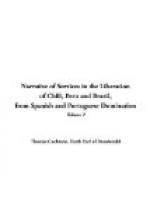On the proclamation of the Empire, two influential Portuguese, in the Assembly, endeavoured to impose a condition on the Emperor that, before ascending the throne, he should make oath to a constitution framed by the Constituent Assembly alone, thus reducing His Majesty to a cypher in the hands of the legislature. The proposition was plausible enough to those who were anticipating power, but it gave rise to such dissensions, that Bonifacio de Andrada and his brother sent in their resignations, which, under these difficult circumstances, were accepted by the Emperor.
A violent tumult amongst the people was the immediate consequence, and His Majesty was induced to recall the patriotic Andradas to the cabinet—they however, refusing to resume their functions, unless their Portuguese opponents were banished; to this the Emperor assented, and the Andradas returned to office amidst the plaudits of the populace, who drew the carriage of Jose de Andrada in triumph into the town.
As might have been expected, less tolerance was manifested by the triumphant ministers than before, this just but perhaps impolitic course being eagerly seized on by the Portuguese faction to excite the apprehension of the patriots, who were somewhat dissatisfied by the revival of what were considered feudal usages; above all, by the creation of an Imperial Guard of Honour, selected from the youth of the principal families, who were required to take an oath “of implicit obedience to His Majesty”—this act being especially represented by the adverse faction as evincing a tendency to absolutism.
On the 20th of June, 1823, a project of law had been laid before the Assembly, for the expulsion of all Portuguese deemed hostile to the cause of the empire. This measure might have originated with the Andradas, or not; it was certainly defended in the Assembly by Antonio Andrada. The Portuguese party, alarmed by the still impending danger, formed a coalition with the Brazilian party, to eject the Andradas from the ministry, and having, during a severe illness of the Emperor, gained the ascendancy, the now obnoxious ministers were dismissed; and—though the patriots had not calculated thereon—were succeeded by the leaders of the Portuguese faction itself, who, to the regret of all true Brazilians, effected an immediate change of policy in the Government.
The chief object of the new administration, appeared to be to limit the functions of the Emperor to an extent almost subversive of his authority; His Majesty, in the unsettled state of the empire, being comparatively powerless amidst the machinations with which he was surrounded.
No constitution had, as yet, been fixed upon—His Majesty resenting the former attempt to force upon him a constitution framed solely by the will of the Assembly, which was still seeking an opportunity to assert its supremacy. As the city and province abounded with influential Portuguese, desirous of overthrowing the new regime, and as many of these were in the Assembly, there was a total want of unity between the Emperor and his legislature, the administration leaning to the side of the latter.




